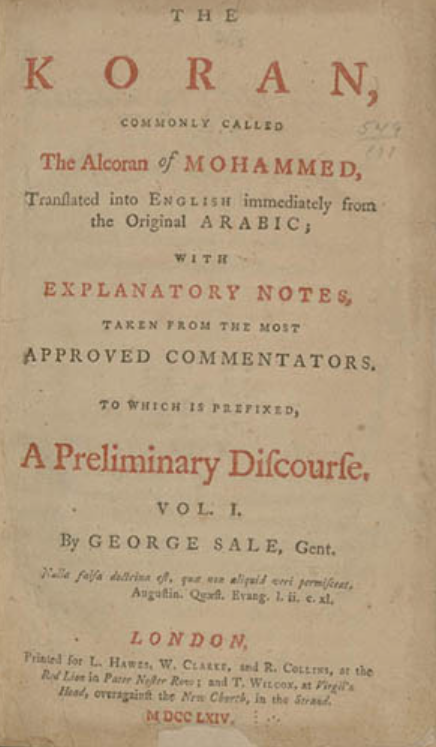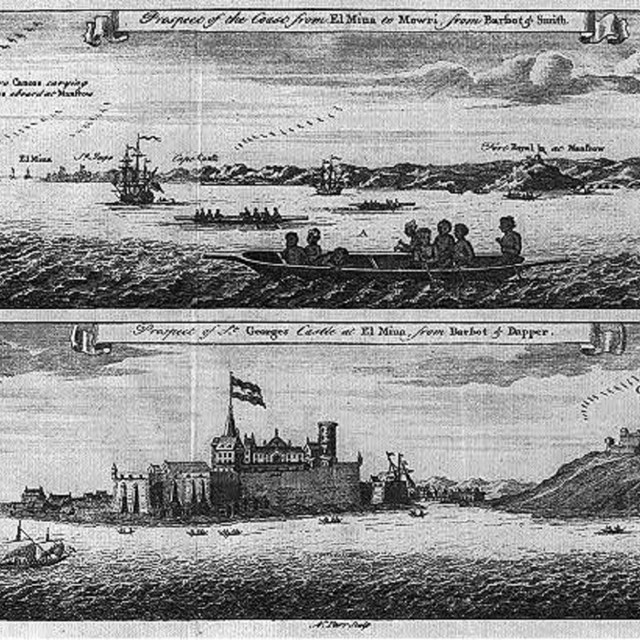
Library of Congress The Islamic Faith -- Roger Williams, Thomas Jefferson, and the US ConstitutionRoger Williams (1603-1683) and Thomas Jefferson (1743-1826) both considered Muslims in their writings and ideologies. Neither Williams nor Jefferson wrote about knowingly interacting with Muslims in America. However, Jefferson may have enslaved Muslims. And Roger Williams likely interacted with the many Muslims who were in London in the 1600s, and possibly spoke some Arabic. Both Williams and Jefferson owned copies of the Holy Qur'an. Although they didn't write about their personal experiences with Muslims, both men used Islam and other minority faiths in early America as a rhetorical device to promote tolerance and imagined the potential of future Muslim citizens. Both men were declaring that in their new societies, future Muslim citizens would have the ability to freely practice their religion and fully participate in civil life. This was a controversial position and one that they failed to live up to themselves, but were addressed in a time marked by widespread and systemic anti-Islamic sentiment. How did they arrive at these principles? The Creation of Secular GovernmentRoger Williams created the first secular government when he founded Providence in 1636. But what does it mean for a government to be “secular”? The word “secular” means something that is not bound by religious rules . In other words, it means something that is "of this world." Roger Williams would have valued and understood a distinction between the inner world of the soul, such as one’s conscience and religion, and the outer world of our physical bodies, the objects around us, and the natural world. In Williams’s time, rulers claimed that they got their authority from god. This gave them power over the inner and outer worlds of their subjects. This led to extreme power over every aspect of people's daily lives. Roger Williams believed that it was wrong for governments to claim they had this power. A secular government is a limited government in that it can only have power over the physical world, meaning that laws can govern people’s actions, but not their soul or sense of right and wrong. Roger Williams called this belief “soul liberty.” "The Ship of State" LetterIn a letter to the Town of Providence, Williams described his vision for a society ruled by a limited, secular government by comparing it to a sailing ship. He says that a government is like a ship. The captain of a ship has no right to force anyone to pray or give up their religious beliefs. He is saying that government has no right to force their citizens to worship. Citizens, like sailors on a ship, have a right to "soul liberty," freedom of conscience, or freedom to believe. Remarkably, Roger Williams names Jews, Catholics, Muslims, and atheists as an example of people who have the right to practice their religion freely and openly. This stands out because he argued that all people have this right, not just some Christians. For making these arguments, Williams was often ridiculed or shunned from his communities. But we hold these values as fundamentally American today. Opposition to Religious FreedomSome people argue that limiting the authority of a government will result in chaos or anarchy. The ship’s captain that Roger Williams describes only has power "to command the ship’s course…and also command that justice, peace and sobriety, be kept and practiced." So a secular government can only have authority over non-religious matters, such as taxes, public projects, laws to maintain peace, and for the general wellfare. This kind of government still has rules, structure, and authority, but leaves individuals free to follow their own conscience about religion. Roger Williams wrote this letter using the metaphor of a ship because it was something that his audience would have easily understood. But, if Williams was writing this letter today, he might have used the metaphor of a sports team. The different players on the team, like the sailors on Williams’s ship, may all have different religious beliefs, and have the right to practice any religion, or none at all. The coach of the team, like the captain of the ship, has power over their bodies – telling them what plays to run, what workouts to do, what time to report to practice or games – but has no power to tell the players what they can and cannot believe. In other words, the coach has no authority over what her players believe are right and wrong, only over what their bodies do while playing the game. Our government is set up the same way. We agree on laws that regulate our bodies and property, but not our beliefs or sense of right and wrong (our conscience). The US ConstitutionThe thoughts and writings of Roger Williams would have a strong influence on the founding generation of America, particularly Thomas Jefferson. Jefferson would enshrine Williams’s beliefs about soul liberty and secular government at both the state and federal level. Echoing this belief, Jefferson wrote to the Danbury Bapstists, "religion is a matter which lies solely between Man & his God." Although Jefferson had no opportunities to write such a letter to an Islamic congregation, his words are just as applicable. In 1777, Jefferson would be instrumental in writing the Bill for Establishing Religious Freedom in Virginia, which ensured civil rights and, notably, the right to run for office for white male members of all faiths. Jefferson would also write the First Amendment of the Bill of Rights of the United States Constitution, which states that “Congress shall make no law respecting an establishment of religion, or prohibiting the free exercise thereof.” The United States of America would have a secular federal government, with no powers over the religious beliefs of its citizens.
|
Last updated: November 30, 2023



